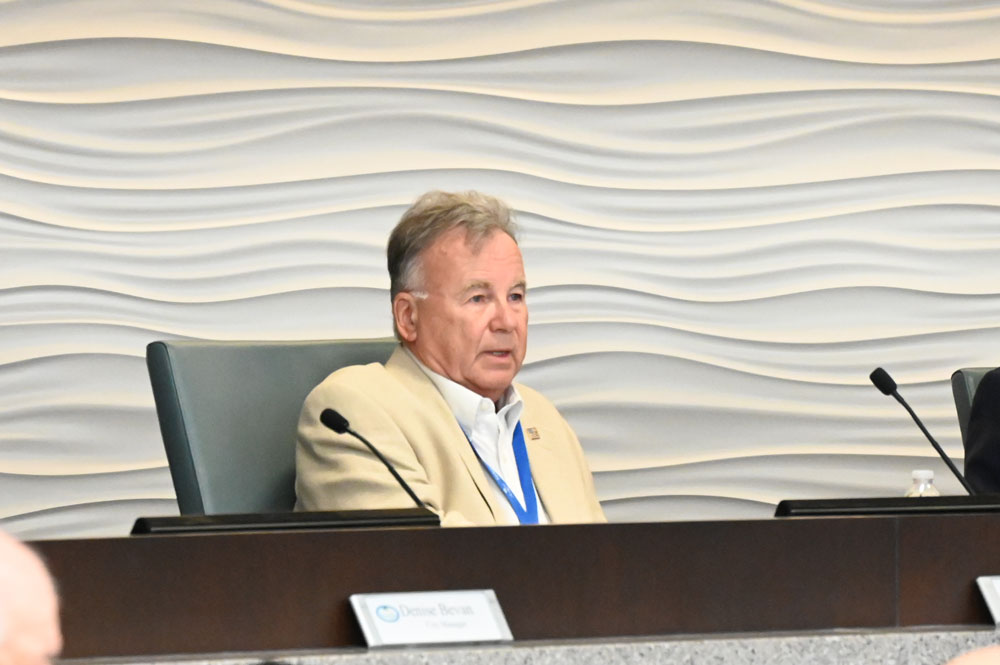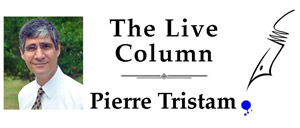
There isn’t enough Dramamine in the house to keep me from feeling disemboweled as I say this. But Ed Danko is right. The Palm Coast City Council member, reigning champion of the odious and obnoxious among our locally elected, is right to resist Mayor David Alfin’s proposal to have all council members sign “Code of Conduct,” including a pledge of civility.
 It simply is not an elected board’s place collectively to regulate or codify its members’ behavior as if they were high school sophomores, even though they act like it at times. It’s never government’s place to force pledges of any kind on anyone. That goes for pledges of loyalty, of civility, of diversity, or even pledges to the flag. “With liberty for all” means with liberty for all: to pledge or not to pledge, to behave or not to behave. For the elected, outside of lawbreaking, voters are the judges. No one else.
It simply is not an elected board’s place collectively to regulate or codify its members’ behavior as if they were high school sophomores, even though they act like it at times. It’s never government’s place to force pledges of any kind on anyone. That goes for pledges of loyalty, of civility, of diversity, or even pledges to the flag. “With liberty for all” means with liberty for all: to pledge or not to pledge, to behave or not to behave. For the elected, outside of lawbreaking, voters are the judges. No one else.
That doesn’t mean elected boards cannot censure or reprimand one of theirs. They can and they should, just as the Florida Commission on Ethics routinely does with elected officials across the state, just as the Supreme Court does with judges. The ethics commission does so only when elected officials break laws. It can impose fines that at times get ignored (ask Dennis McDonald).
The court does so when judges break the judicial code of conduct, an ideal document that should apply to all elected officials–but in principle, not in code. It’s different for judges because they’re barely elected, and once they are, they wield enormous power largely out of public view. They really have no colleagues in the true sense of the term, and aside from celebrity cases, media have given up on covering courts. The judicial code provides the necessary accountability that voters and the press do not.
That’s not the case on local elected boards. They’re enough in the public eye to make codes an inappropriate usurpation of public accountability and elected responsibility. To the extent that elected officials are also electors, of course they may censure and reprimand, if they so decide, as the County Commission should have censured the reprehensible Joe Mullins the roughly 7,000 times it had cause to, as the council should have censured some of its own, Danko included, on thankfully fewer occasions.
But that’s an expression of the moment, like a resolution, speaking in the immediate for the elected on that board, without presuming to speak for government at all times. Curiously, the only people who think censures have no power are the elected. Would they say the same thing about, say, a Rotarian of the Year award, which also means nothing more than what it says? Of course not. It’s a statement, an honor. A public censure is also just a statement–a dishonor. It’s not meaningless. But the elected prefer to protect themselves from that risk by claiming, self-servingly, that it is.
The problem with Palm Coast’s Code of Conduct is two-fold. It implicitly presumes to define civility, though its vagueness does no such thing beyond the obvious (the obvious is set out in law). Worse, it presumes to tell members what they may and may not say. It restricts their freedom of expression once the board has taken a position on an issue.
But the elected don’t give up their freedom of speech once a vote closes the door on an issue any more than do members of the public. For the council to presume to police a member’s speech or behavior after a vote implies that boards are more autocratic than democratic.
We see this at the Flagler County School Board, where the undemocratic sullies of the Florida School Board Association are routinely on display. The state association imposes its autocratic methods through its “Master Board” training, an awful exercise in groupthink whose rhyme sums up its substance. It tells members, falsely, that once they vote on something, they may not dissent further, especially publicly.
Read Related Also: Murder suspect who got caught by a dog pleads guilty to kidnapping elderly couple, escaping prison
Flagler School Board members, several of whom are already predisposed to Leninist decrees of speech–Sally Hunt, Will Furry, Christy Chong–have used that ridiculous edict to muzzle each other, as if they were a club whose members’ first allegiance is to the club, not to voters. Selectively, anyway. Those three have no problem breaking their own rules and policies when it suits them, using the dais to slander employees as they did the previous superintendent (among others), as they continue to do the current attorney or their colleagues, or to misuse their School Board Facebook page, as Furry, who seems to have an awful lot of time on his hands, did over Halloween.

Of course it’s crass, moronic, sleazy, but it’s of a piece with who these characters are. Voters put them there. Voters can remove them in time, as fellow-board members thankfully cannot.
Civility on elected boards is not an end in itself. Elected boards are for debate–rigorous, independent, sometimes angry debate. They are a reflection of our electorate, not of government rules. Right now our electorate is divided, angry, at times obnoxious. Some of these elected officials are of their moment.
On the other hand, sharp, even outraged dissent and civility are not mutually exclusive. Council member Theresa Pontieri is a master in disagreeing forcefully, intelligently and decorously, with Nick Klufas a close second, at least when he chooses to exercise that skill, which has unfortunately become rarer the closer he approaches his perilously overcautious run for a County Commission seat.
Pontieri’s dissents drive the conversation as Danko’s bluster rarely does. It is not a coincidence that in opposing the Code of Conduct, Danko made his case persistently but with uncharacteristic calm and force, as if Pontieri was rubbing off on him.
Alfin’s goal is unassailable. He wants council members to set the highest standard. He wants the council to be a self-policing forum for brisk but civil debate. And he wants to send a message against the degradation of discourse and political engagement. But the fact is that he and the manner in which he chairs meetings have already done all that. Codifying it would not be merely redundant. It would constrain and undermine one of his most substantial achievements.
![]()
Pierre Tristam is FlaglerLive’s editor. A version of this piece airs on WNZF.









